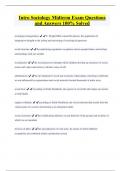Solidarity networks Study guides, Class notes & Summaries
Looking for the best study guides, study notes and summaries about Solidarity networks? On this page you'll find 45 study documents about Solidarity networks.
All 45 results
Sort by
 Popular
Popular
-
LRM4801 Assignment 13 Answers (Due date: 10 January 2024)
- Other • 14 pages • 2024
-
- $2.71
- 2x sold
- + learn more
LRM4801 Assignment 13 Answers (Due date: 10 January 2024) APPENDIX A: ASSESSMENT 13 Please Note: This written Assessment must be submitted in PDF format via myUnisa. Instructions on how to submit the Assessment are provided in section 6 of this document. You are expected to meet particular requirements relating to the layout and technical presentation of Assessments: • The cover page or first page of your document should display information such as the module code, Assessment num...
 Popular
Popular
-
MGT 420 Topic 4 - Adaptive Practice 100 Q's and A's Grand Canyon
- Exam (elaborations) • 66 pages • 2023 Popular
- Available in package deal
-
- $39.99
- 1x sold
- + learn more
1. Question:One effective way a company can attempt to curb social loafing is to 2. Question:Francine and two other coworkers are assigned to evaluate a process and prepare areport.Francinehasalotofotherassignments,sosheexplainsthistohercoworkersandletsthemwritethereport.Thisillustrates 3. Question:The Improvement Process Project has input from four department leaders in thecompany. The suggestions conflict with one another, as each suggestion favors thedepartmentleader’sconcernsfortheirwork...

-
SOWK 341 EXAM 1 (100% Accurate Answers)
- Exam (elaborations) • 18 pages • 2023
-
Available in package deal
-
- $12.94
- + learn more
group culture correct answers values, beliefs, customs, and traditions held in common by group members FOCUS OF GROUP WORK correct answers to help individuals, families, groups, community, and organizations function PRACTICE VALUES IN GROUP WORK correct answers are influenced by the system of our own values and professional values. GROUP WORK VALUES correct answers Cooperation, group decisions, participation FOUR KEY VALUES IN GW correct answers Respect and dignity solidarity and ...

-
Intro Sociology Midterm Exam Questions and Answers 100% Solved
- Exam (elaborations) • 15 pages • 2024
- Available in package deal
-
- $12.49
- + learn more
Intro Sociology Midterm Exam Questions and Answers 100% Solved sociological imagination ️️C. Wright Mills coined this phrase; the application of imaginative thought to the asking and answering of sociological questions social structure ️️the underlying regularities or patterns in how people behave and in their relationships with one another socialization ️️the social processes through which children develop an awareness of social norms and values and achieve a distinct sen...

-
AAMC FL 2 PS Exam with correct Answers 2024
- Exam (elaborations) • 24 pages • 2024
- Available in package deal
-
- $12.49
- + learn more
AAMC FL 2 PS Exam with correct Answers 2024 When comparing the color perception of humans and baboons, similarity in which anatomical structure of the eye is most important? A.Optic disc B.Sclera C.Fovea D.Lens -Answer-color will always be seen more in the fovea because that is where a ton of cones are "During this phase, the target colors included colors all across the blue-green continuum. The response options were always a focal blue and a focal green." -Answer-So when looking at t...

-
AAMC FL 2 PS Exam Questions and Answers
- Exam (elaborations) • 24 pages • 2024
- Available in package deal
-
- $13.49
- + learn more
AAMC FL 2 PS Exam Questions and Answers When comparing the color perception of humans and baboons, similarity in which anatomical structure of the eye is most important? A.Optic disc B.Sclera C.Fovea D.Lens -Answer-color will always be seen more in the fovea because that is where a ton of cones are "During this phase, the target colors included colors all across the blue-green continuum. The response options were always a focal blue and a focal green." -Answer-So when looking at the ...

-
AAMC FL 2 PS Exam with correct Answers 2024
- Exam (elaborations) • 24 pages • 2024
- Available in package deal
-
- $12.49
- + learn more
AAMC FL 2 PS Exam with correct Answers 2024 When comparing the color perception of humans and baboons, similarity in which anatomical structure of the eye is most important? A.Optic disc B.Sclera C.Fovea D.Lens -Answer-color will always be seen more in the fovea because that is where a ton of cones are "During this phase, the target colors included colors all across the blue-green continuum. The response options were always a focal blue and a focal green." -Answer-So when looking at t...

-
AAMC FL 2 PS question with 100% correct answers
- Exam (elaborations) • 25 pages • 2023
- Available in package deal
-
- $14.99
- + learn more
AAMC FL 2 PS question with 100% correct answersWhen comparing the color perception of humans and baboons, similarity in which anatomical structure of the eye is most important? A.Optic disc B.Sclera C.Fovea D.Lens - correct answer color will always be seen more in the fovea because that is where a ton of cones are "During this phase, the target colors included colors all across the blue-green continuum. The response options were always a focal blue and a focal green." - correct answer...

-
AAMC FL 2 PS exam questions fully solved & verified for accuracy 2024
- Exam (elaborations) • 25 pages • 2024
- Available in package deal
-
- $15.99
- + learn more
When comparing the color perception of humans and baboons, similarity in which anatomical structure of the eye is most important? A.Optic disc B.Sclera C.Fovea D.Lens color will always be seen more in the fovea because that is where a ton of cones are "During this phase, the target colors included colors all across the blue-green continuum. The response options were always a focal blue and a focal green." So when looking at the graph choices, you need to choose the one where the...

-
Sociology in Modules 4th Edition By Schaefer - Test Bank
- Exam (elaborations) • 550 pages • 2023
-
- $23.82
- + learn more
Chapter 03 - Culture Multiple Choice Questions 1. Anthropologist Horace Miner's description of the body ritual among the Nacirema is used to show A. cultural differences in what is considered "beautiful." B. the effects of media on a person's body image. C. the ability to learn something new about society. D. how cultural sociology has evolved over the years. Accessibility: Keyboard Navigation Blooms: Understand Learning Objective: Explain the sociological meaning of culture and soci...

Do you wonder why so many students wear nice clothes, have money to spare and enjoy tons of free time? Well, they sell on Stuvia! Imagine your study notes being downloaded a dozen times for $15 each. Every. Single. Day. Discover all about earning on Stuvia


